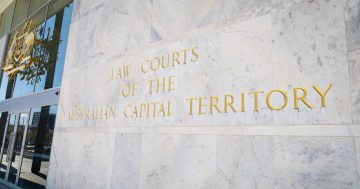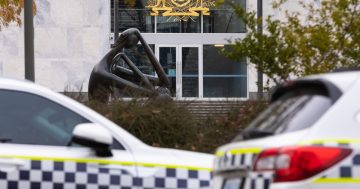Mr Simon Corbell MLA
Attorney-General for the Australian Capital Territory
GPO Box 1020, Canberra, ACT, 2601
Dear Mr Corbell
I am writing as a resident of the Australian Capital Territory, and as a constituent of the Electorate of Molonglo, to express my concern and anxiety regarding the willingness of the ACT judiciary – in particular the Justices of the ACT Supreme Court – to deal appropriately with alleged and proven criminals in the interests of public safety and community expectations.
Firstly, I should declare that I am an admitted Barrister and Solicitor in the ACT Supreme Court. However, whilst I have a strong interest in the administration of criminal justice, I do not practice or have any expertise in the area. Nonetheless, I believe that my understanding of the legal system, and my detachment from the day-to-day administration of criminal justice, means that I am in a good position to comment on what I consider to be an undue focus on the interests of alleged and proven offenders at the expense of the interests of the wider community, and victims in particular.
I draw your attention to the repeated appearance of one Mr Justin Monfries before the ACT Supreme Court, and more recently the appearance of one Mr Jermaine Goolagong before that same Court. Indeed, it was the more recent matter of Mr Goolagong’s appearance before Higgins CJ, which was reported in The Canberra Times,[1] that has prompted me to write this letter. Whilst that matter on its own is not particularly noteworthy, I believe that it is indicative of a wider trend in the Court to consider community safety, the community’s expectations of standards of behaviour, and particularly the interests of victims, as an afterthought only.
As you would be aware, Mr Monfries most recently came before the ACT Supreme Court (Refshauge J) in March this year. On this occasion, Mr Monfries was sentenced for numerous offences, including driving a stolen motor vehicle, theft, obtaining property by deception, and multiple breaches of bail.
Prior to coming before the Court in March, Mr Monfries had already accumulated multiple convictions in the ACT and NSW for similar offences, and had served several sentences of imprisonment in NSW.
Despite the severity of the offences and his substantial criminal record, Mr Monfries was sentenced to three years’ imprisonment, wholly suspended, noting time served while on remand.
In my opinion, this sentence was entirely inadequate. I note that section 7 of the Crimes (Sentencing) Act 2005 (ACT) provides as follows:
Purposes of sentencing
(1) A court may impose a sentence on an offender for 1 or more of the following purposes:
(a) to ensure that the offender is adequately punished for the offence in a way that is just and appropriate;
(b) to prevent crime by deterring the offender and other people from committing the same or similar offences;
(c) to protect the community from the offender;
(d) to promote the rehabilitation of the offender;
(e) to make the offender accountable for his or her actions;
(f) to denounce the conduct of the offender;
(g) to recognise the harm done to the victim of the crime and the community.
(2) To remove any doubt, nothing about the order in which the purposes appear in subsection (1) implies that any purpose must be given greater weight than any other purpose.
I have read the sentencing decision in relation to Mr Monfries’ March hearing, which is available on the ACT Supreme Court website,[2] and I consider that Refshauge J gave inadequate consideration to subsections (1)(a), (1)(b), (1)(c), (1)(e), (1)(f) and (1)(g) of the Crimes (Sentencing) Act. I believe this is an endemic issue in the ACT Supreme Court, and I strongly believe that despite subsection (2), subsection (1)(d) is consistently given inordinate weight by the Court.
Approximately two months after his release, Mr Monfries is alleged to have killed one woman and seriously injured another when he ran a red light whist evading police in a stolen car under the influence of alcohol and drugs. Mr Monfries is, of course, currently presumed innocent in relation to these allegations. However, one cannot help but suspect that the surviving victim and the families of both victims must feel that they were completely let down by the ACT judiciary. It is easy to comment with the benefit of hindsight, but in my opinion, given the information before the Court at Mr Monfries’ March sentencing hearing, such a tragedy was entirely foreseeable, and I strongly believe that Refshauge J is culpable for the dereliction of his duty to the community.
More recently, Mr Jermaine Goolagong is alleged to have crashed a stolen vehicle into another road user while on bail for charges relating to car theft. As a result, Magistrate Bernadette Ross revoked Mr Goolagong’s bail and again refused bail in October. However, Mr Goolagong was subsequently released on bail by Higgins CJ in November after His Honour noted the ACT’s inadequate capacity to provide mentally ill prisoners an alternative to custody. Whilst this is a widely expressed concern, I feel that the safety of the community should be of paramount concern in bail hearings. I have said above that Mr Monfries’ alleged offences in May this year ought to have been foreseen by the Court – I sincerely hope that I am not making similar observations in the future should Mr Goolagong reoffend while on bail.
In summary, I am deeply concerned about the ACT judiciary’s focus on the interests of alleged and proven offenders at the expense of the community and victims in particular. I understand that the separation of powers means that the legislature and the executive have limited capacity to interfere in the judicial process. However, I submit that we are now at a point where the ACT Government must seriously contemplate the mechanisms available to rein in what I consider to be an activist and permissive judiciary that does not reflect the expectations of the community.
Given the public interest in this matter, I have also provided a copy of this letter to Mr Zed Seselja (ACT Shadow Attorney-General), Mr Shane Rattenbury (ACT Greens’ spokesperson for the Attorney-General’s portfolio), ACT Supreme Court Chief Justice Terence Higgins, ACT Supreme Court Justice Richard Refshauge, and The Canberra Times.
Yours sincerely
Kieren Lee-Murphy
[1] Andrews, Louis, “Teen on bail despite claim he fled crash scene”, The Canberra Times, 28 November 2012.
[2] http://www.courts.act.gov.au/supreme/sentence/view/1176/title/r-v-monfries




















